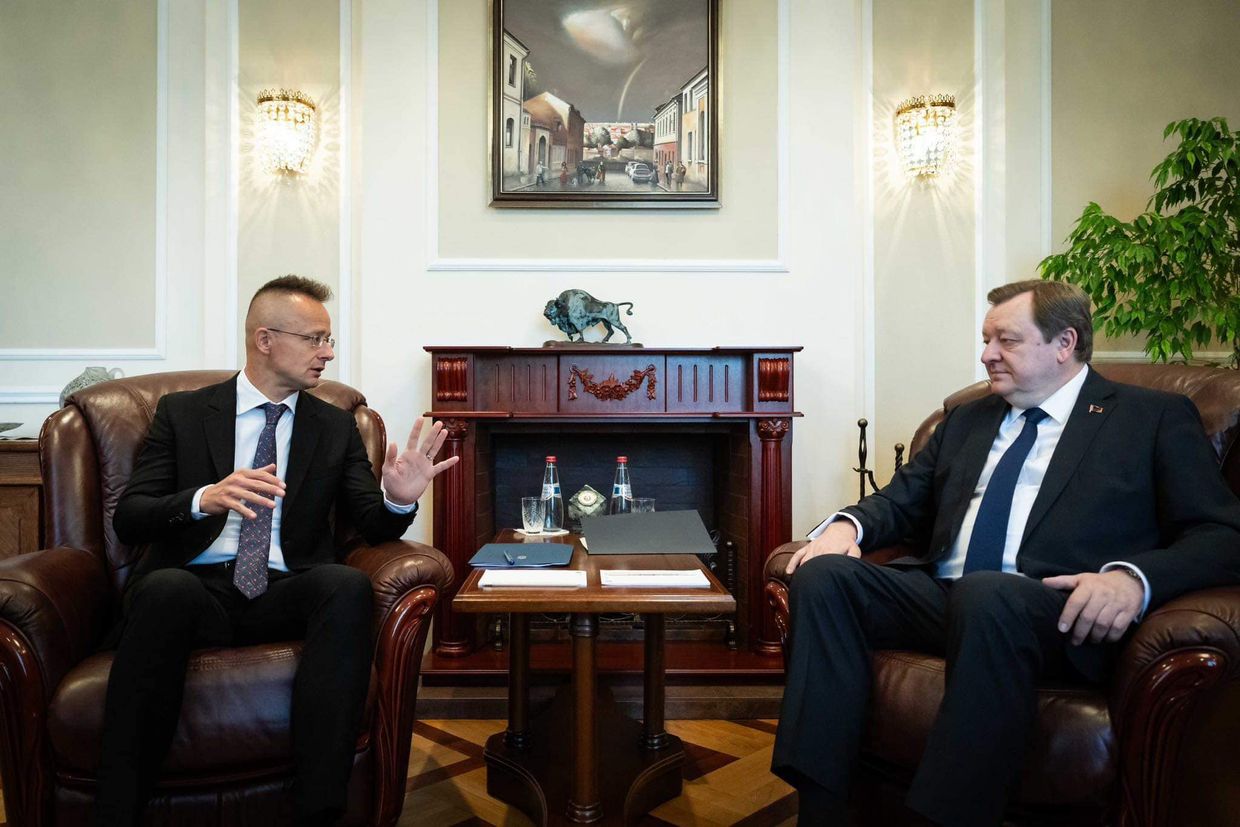Hungarian Foreign Minister Péter Szijjártó visits Belarus, despite EU sanctions.
Poland to reinstate 200-meter buffer zone at Belarus border amid surge in attacks on border guards and worsening of the Belarus-instigated migration crisis at EU border.
EU approved tariffs on Russian and Belarusian grain products to cut funding for Russia's war against Ukraine.
Belarus suspends participation in Conventional Armed Forces Treaty
Twenty exiled political analysts and journalists accused of helping opposition leader Sviatlana Tsikhanouskaya campaign in the 2020 presidential elections are now charged in absentia.
Hungarian foreign minister visits Belarus despite EU sanctions, signs nuclear energy agreement
Hungarian Foreign Minister Péter Szijjártó arrived in Minsk on May 29 for talks on broadening economic cooperation, despite European sanctions being in effect against the regime of Belarusian dictator Alexander Lukashenko.
Arriving for a Belarusian-Hungarian business forum in Minsk with 24 representatives of Hungarian companies, Szijjártó said, “Our position is clear: the fewer sanctions, the more cooperation!”
Szijjártó reiterated that Hungary does not agree with the EU sanctions, and would develop ties "in areas not affected by sanctions.”
During the visit, Belarusian and Hungarian officials signed a memorandum on cooperation in the nuclear energy sector, envisaging training for personnel and handling radioactive waste.
“The experience Belarus gained while constructing reactors with a similar technology” might be of use to Hungary, Szijjártó said. Budapest is currently building its second nuclear power plant — Paks II.
Belarus commissioned its first and only Russian-built nuclear power plant in November 2020, sparking safety concerns in neighboring Lithuania. Reportedly, the plant was built with a multitude of flaws and has been undergoing repairs for nearly 40% of the time since it started operating.
Designed as a way to escape energy dependency on Russia, the plant was also to sell its energy to Lithuania, Poland, and Ukraine, but these markets have been cut off due to the Lukashenko regime’s complicity in Russia’s war against Ukraine.
Despite the plant’s economic inefficiency, Belarusian dictator Lukashenko has said he is considering building another nuclear plant in Belarus with the help of the Russian nuclear corporation Rosatom.
Meanwhile, Belarusian Foreign Minister Sergei Aleinik said he hoped “healthy trends” would appear in Europe when Hungary takes over the EU’s six-month rotating presidency in July.
Hungary is the only EU member state that has maintained ties with the Lukashenko regime and sent an ambassador to Belarus following the fraudulent presidential elections in 2020 and the regime’s subsequent harsh crackdown on dissent.
Franak Viachorka, the chief political advisor to Belarus’ democratic leader Sviatlana Tsikhanouskaya, noted the regularity of the visits, and labeled Hungary's stance “hypocritical.”
“Such meetings mean splitting EU unity in the policy to isolate the Lukashenko regime, legitimizing repression and terror against Belarusians,” Viachorka wrote on X.
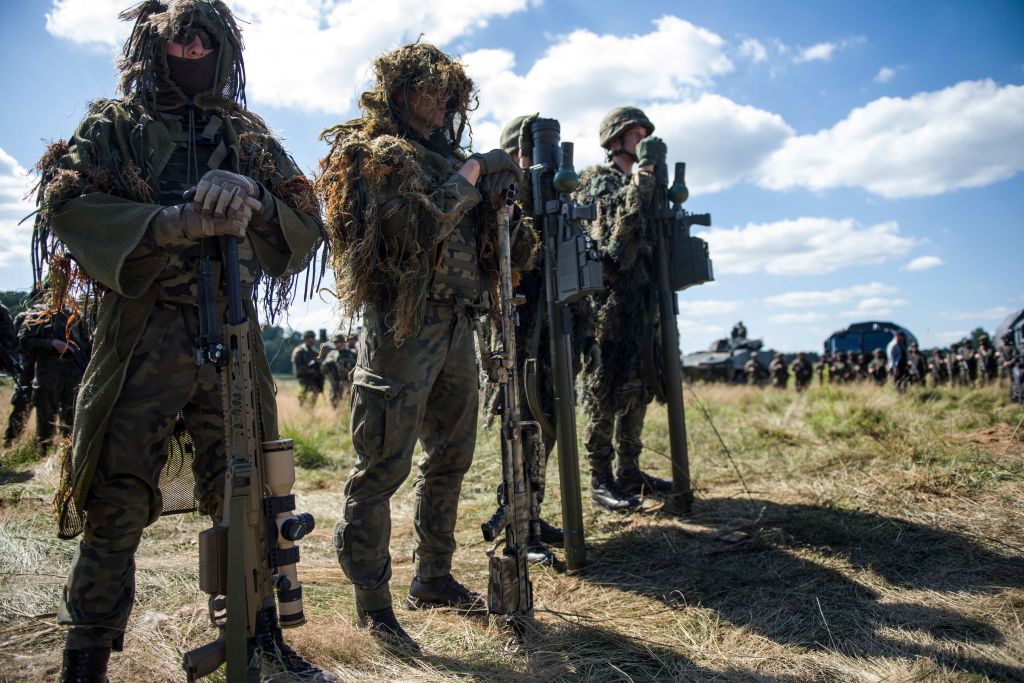
Poland to reinstate buffer zone at border with Belarus amid multiple attacks on border guards
Poland will reintroduce a 200-meter buffer zone on its border with Belarus amidst an intensified migration crisis and attacks on its border guards, Prime Minister Donald Tusk said on May 29.
The buffer zone, initially set to be introduced on June 4, was delayed until later this week due to the need for more planning and consultations with local authorities, national parks, and public organizations, Interior Minister Tomasz Siemoniak said at a press conference on June 3.
In the meantime, the border is being reinforced with 100 more soldiers, in addition to the existing 190-kilometer long metal fence, Polish radio station RMF FM reports.
The interior minister also noted that the number of attempts to illegally cross the Polish-Belarusian border has doubled compared to 2023, and levels of aggression towards soldiers and officers have increased.
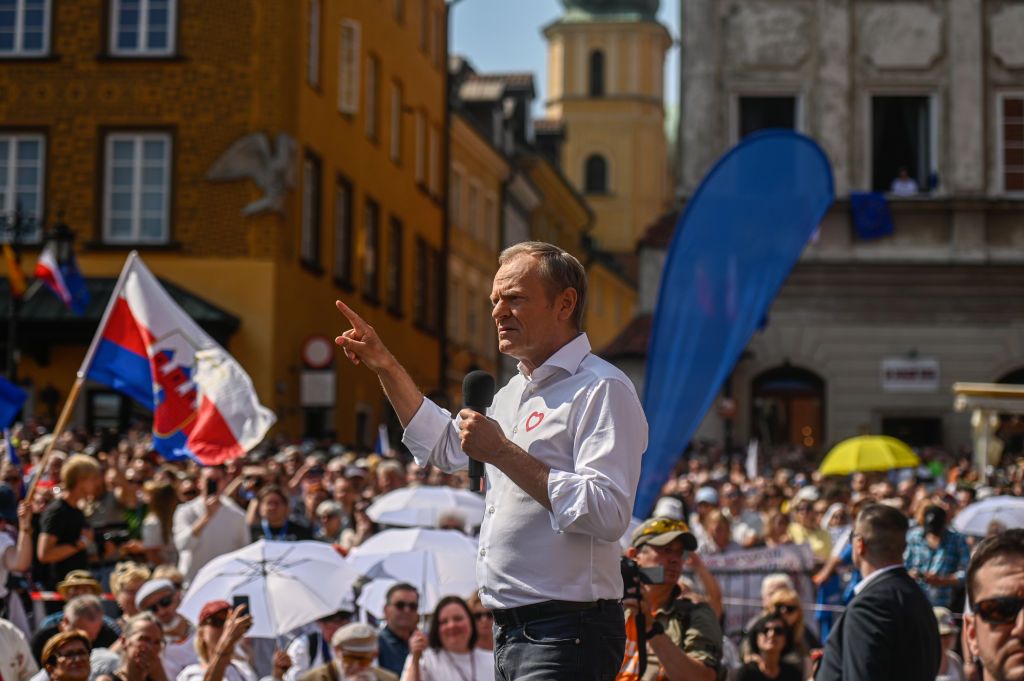
The announcement came after a Polish border guard was stabbed through the existing fence on May 28 with a makeshift spear by a migrant who was attempting to cross the border illegally. Officials said the soldier remains hospitalized in a serious condition.
On May 31, Polish border guards reported two more hospitalizations of guards following attacks by illegal migrants. On June 3, another Polish officer received a head injury when migrants threw thick tree branches from the Belarusian side of the border.
Poland blames Russia and Belarus for using the migration crisis to conduct hybrid warfare against the EU.
“For several months, we have been observing (a rise in) the intensity of attempts to cross the border by people who in no way want to get asylum or shelter, but who are a tool in the hands of the special services of Belarus and the Russian Federation,” said Defense Minister Wladyslaw Kosiniak-Kamysz.
“Most of them have Russian visas.”
On June 3, Foreign Minister Radoslaw Sikorski announced that the intensification of hybrid war had forced Poland to drop the idea of reopening one of its border crossings with Belarus. Prime Minister Tusk had earlier promised to consider reopening a crossing at the request of local businesses that depend on cross-border traffic.
Tusk announced earlier in May that Poland plans to invest 10 billion zlotys ($2.55 billion) in strengthening its borders with Russia and Belarus to deter potential aggression.
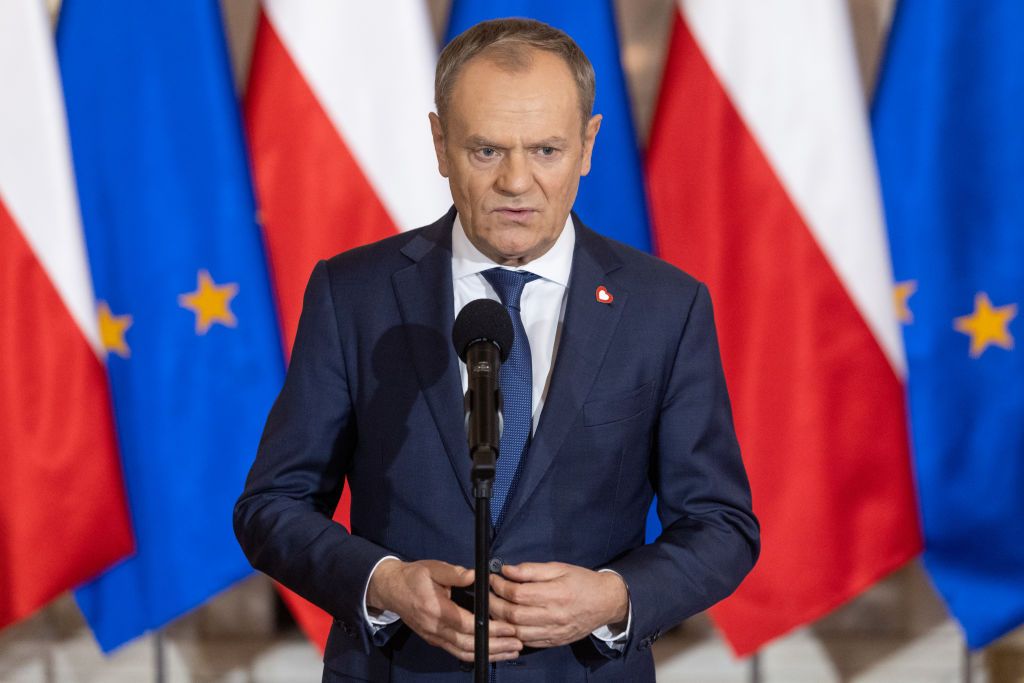
EU approves tariffs on Russian, Belarusian agricultural products
The EU Council adopted a regulation to increase tariffs on certain agricultural products from Russia and Belarus on May 30.
The regulation, which the European Commission proposed on March 22, limits EU imports of Russian and Belarusian cereals, oilseeds and derived products, beet-pulp pellets, and dried peas. All are currently subject to no or low tariffs.
According to Business Insider, the tariff would reach 95 euros ($103) per ton on corn and wheat, while oilseeds and derived products would be subject to an “ad valorem duty” of 50%.
The new regulation, designed to halt grain imports from the two states, enters into force on July 1, but does not affect transit shipments to third countries.
“These measures will, therefore, prevent the destabilization of the EU’s grain market, halt Russian exports of illegally appropriated grain produced in Ukraine, and prevent Russia from using revenues from exports to the EU to fund its war of aggression against Ukraine,” Belgian Finance Minister Vincent Van Peteghem said.
Belarusian Foreign Ministry spokesman Anatoli Glaz said the decision was “a blow to global food security” and “flouted” the general rules of international trade, as well as WTO rules.
Russia exported around 1.4 billion euros worth of grain products to the EU in 2023. European imports of grains, oilseeds, and their derivatives from Russia reached a record 4 million metric tons in 2023, which is 1% of total EU consumption, Financial Times reported earlier this year.
Belarusian grain exports to Europe are far more modest. In 2023, Belarus exported only 610,000 tons of such products, worth about 246 million euros. However, agricultural product derivatives, such as malt, starch, inulin, and wheat gluten, saw a surge in exports in 2023, reaching 4.78 million euros, according to Belarusian news agency Belsat.
Belarus suspends its participation in Conventional Armed Forces Treaty
Lukashenko has signed a law suspending Belarus’ involvement in the Treaty on Conventional Armed Forces in Europe (CFE), which was designed to establish arms limits in NATO and Warsaw Pact countries.
The law suspending the treaty was published on Belarus’ official legal platform on May 29, following its adoption by the country’s lower chamber of parliament on April 5 and its subsequent approval by the upper chamber on May 6.
The law states that the suspension “does not mean Belarus is withdrawing from it, or the cessation of internal procedures in the Armed Forces related to its implementation.”
Lukashenko’s press office justified the move by referring to a similar suspension of the treaty by NATO member states.
In the wake of Russia’s all-out invasion of Ukraine, the Czech Republic officially notified Belarus in August 2022 that it would not fulfill its obligations under the CFE with respect to Belarus. Poland announced a similar decision in March 2023. Lukashenko’s parliament responded with symmetric measures against Prague and Warsaw on Sept. 19, 2023.
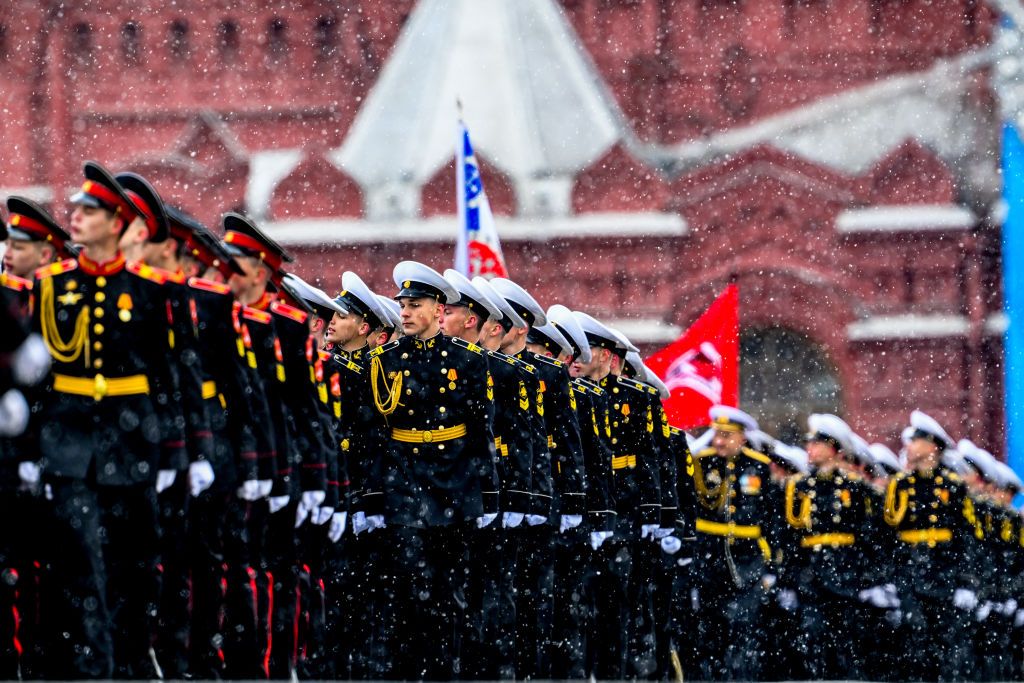
The countries have since stopped exchanging information on their conventional arms and equipment. Mutual compliance inspections and the limits on the number of these weapons imposed by the CFE Treaty were also halted.
Russia formally withdrew from the CFE in November 2023, prompting NATO to announce it would suspend the treaty in response.
“While recognizing the role of the CFE as a cornerstone of the Euro-Atlantic security architecture, a situation whereby Allied States Parties abide by the Treaty, while Russia does not, would be unsustainable,” NATO’s press service wrote.
The CFE Treaty was negotiated between NATO and Warsaw Pact countries at the end of the Cold War to limit the size of forces that could be used in a swift offensive.
The treaty was signed in Paris in November 1990 and was initially agreed upon by 16 NATO members and six countries of the former Warsaw Pact, including the Soviet Union. Belarus ratified the agreement in 1992.
Belarus tries 20 political analysts in absentia
In absentia trials against 20 political analysts and journalists, dubbed Tsikhanouskaya’s analysts after Belarusian opposition leader Sviatlana Tsikhanouskaya, opened in Minsk on May 31.
The exiled experts and journalists, many of whom work with world-renowned universities and think tanks, have been accused of conspiring to overthrow the government and taking part in an extremist group. If found guilty, they could face up to 12 years of imprisonment and seizure of property.
Listed among the accused in the case are the Belarusian Initiative director at the U.K. think tank Chatham House, Ryhor Astapenya, and RFE/RL analyst Yury Drakakhrust, as well as several advisors to Tsikhanouskaya, including associate researcher at the University of Strasbourg Yauheni Kryzhanouski, policy analyst and PhD fellow at Virginia Tech University Katsiaryna Shmatsina, and researcher at the City University of Manchester and Vilnius University Tatiana Chulitskaya.

Belarusian authorities have accused all of them of helping Tsikhanouskaya to campaign against Lukashenko in the presidential elections in 2020.
Fourteen out of 20 defendants put forward a joint statement, noting the politically motivated nature of the trial and legal violations in its proceedings.
“All those arbitrarily grouped together in the ‘case’ were engaged in purely professional activities that cannot be related to the acts charged in the indictment,” the statement reads.
Secretary General of the Council of Europe, Marija Pejčinović Burić, condemned the trial, linking it to the wider political repression in Belarus.
Civil society in Belarus has been subjected to a four-year-long repressive crackdown.
Between 300,000 and 500,000 Belarusians have been forced out of the country of 9.5 million. Having oppressed every form of dissent domestically, the Lukashenko regime is now seeking to silence its exiled opponents with in absentia trials and property seizures.
Four years of political repressions
May 29 marks exactly four years since the detention of Siarhei Tsikhanouski, the first political prisoner of the 2020 presidential campaign in Belarus. On this day, the Viasna Human Rights Center released a report detailing the scope of repressions that has engulfed Belarus in the last four years.
According to human rights activists, at least 5,133 Belarusians have been charged in politically motivated criminal cases, and over 36,000 underwent administrative prosecution. Six political prisoners have died in detention.
Since 2020, 1,012 Belarusian political prisoners have served their terms in full, and the human rights community records dozens of new prisoners every month. In April 2024, the total number of current and former officially declared political prisoners neared 3,150.
Belarus has declared 4,100 of its citizens to be “extremists” and 400 to be “terrorists.”
Viasna marks all of its numbers with an asterisk, noting that those figures encompass only the data reported to them, and suggesting that the real toll of repression is much higher.




